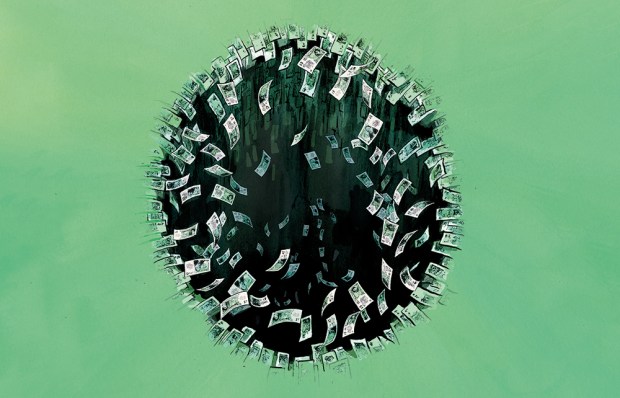What could be more terrifying than a return to the 15 per cent interest rates with which homebuyers had to contend in the early 1990s? Possibly the vision presented last week in UBS’s Global Economic Outlook: interest rates at minus 5 per cent. It would take us to an unknown world where savers who deposited £100 in a bank would return a year later to find only £95 left.
This month’s small rise in interest rates has rekindled fears that the era of ultra-low rates could be at an end and that millions of borrowers, enticed into loans thinking rates of virtual zero are normal, could be left with debts they could not repay. But there is an alternative scenario. UBS notes that during the last crisis the Bank of England slashed rates from a peak of 5.75 per cent in the summer of 2007 to a low of 0.5 per cent 18 months later. If we were to head into another recession with rates at 0.5 per cent, the bank reasons, it would require a similar loosening of monetary policy, with rates having to go well into negative territory.
It would ensure that, as after the 2008/09 crisis, the people who ended up paying the price for the latest binge in consumer debt were not borrowers at all but savers; people who carefully put money aside while others splashed out. Their savings would effectively be raided to bail out the reckless.
We can expect a recession sooner rather than later, too — Brexit or no Brexit. Eight years, historically, has been a long time to go without a recession. Moreover, personal debt is building again to unsustainable levels. In September, the outstanding unsecured debts of UK consumers once more nudged over £200 billion, the level it reached in the summer of 2007.
Trouble is, how does a Central Bank impose interest rates that are significantly below zero? Until recently it was thought impossible. But in recent times we have had mildly negative rates. The European Central Bank has had a deposit rate of minus 0.4 per cent since early 2016. In one or two cases this has been passed on to savers. This March, UBS started charging depositors with more than €1 million in their accounts an interest rate of minus 0.6 per cent.
But there is a very big problem to overcome before banks could start imposing interest rates of minus 5 per cent on ordinary savers. What if, instead of sitting by and watching our savings whittled away by negative interest, we instead withdrew them en masse and stuffed them under the mattress?
Quite a lot of us appear to have done exactly this during the banking crisis. A little remarked-upon phenomenon of that time was the sudden and remarkable rise of banknotes in circulation. Throughout the early to mid-2000s the combined value of sterling banknotes had hovered around the £36 billion mark. Then in the space of two years following the run on Northern Rock, it surged more than 30 per cent to £48 billion.
How, then, to dissuade people from provoking a run on banks by withdrawing their savings in cash in order to avoid negative interest rates? This is where a rather underhand campaign comes in — to abolish cash altogether.
The Bank of England’s chief economist Andy Haldane made that very proposal in the relatively obscure surroundings of the Northern Ireland Chambers of Commerce in October 2015, saying: ‘One interesting solution, then, would be to maintain the principle of a government–backed currency, but have it issued in an electronic rather than paper form. This would preserve the social convention of a state-issued unit of account and medium of exchange, albeit with currency held in digital rather than physical wallets. But it would allow negative interest rates to be levied on currency easily and speedily.’
Two weeks later a proposal to end physical currency very nearly made it into David Cameron’s Conservative conference speech. Britain, he was going to say, would become the world’s first cashless economy by 2020. According to the then Downing Street adviser, Daniel Korski, the idea was going to be sold as making Britain ‘the centre for innovation for money in the future’, which would also help to tackle crime. In the event it was left out of the speech after George Osborne got cold feet and felt that the public was not ready for such a dramatic move.
Abolishing cash to help set negative interest rates has been proposed, too, by Kenneth Rogoff, former chief economist of the International Monetary Fund. He argues that interest rates in the US at the height of the 2008/09 crisis should ideally have been lowered to minus 4 or minus 5 per cent, had it been possible.
It was Osborne, though, who is right. Attempting to withdraw physical currency would create anger, and not just for fogeyish reasons among people who like to see the Queen’s head on their coin and banknotes. It would enable the payments industry — which needless to say is a keen advocate of a cashless economy — hugely to increase charges for handling electronic payments. According to the Boston Consulting Group, the industry is smacking its lips at the prospect of doubling its annual worldwide income in fees from £1 trillion to £2 trillion by 2023 as consumers are persuaded, and in some cases forced, to go cashless. A cashless economy would disenfranchise the poor, who struggle to obtain bank accounts, put the retail economy at the utter mercy of systems which can and do fail, and make life impossible for businesses in rural areas without broadband connections.
It would do little to reduce crime, as many criminals and money launderers have already gone cashless. Just ask yourself: when did you last have a pickpocket try to steal cash from your wallet — and when did you last receive a phishing email attempting to empty your account and spirit the money overseas? In 2015, Britons lost a total of £750 million to cashless crime. Just because electronic transactions are theoretically traceable doesn’t mean that the police, or any other authority, are in practice minded to do the tracing.
It would take a little longer for the public to realise the underlying reason why governments and central bankers are so keen on a cashless economy — so that, come a recession, they could try to re-inflate a burst bubble by imposing negative interest rates. The last financial crisis left a nasty taste in the mouth: the wrong people were made to suffer. But that will be nothing compared with the injustices that will be wrought on blameless deposit-holders in the next crisis if we allow governments to abolish cash.
Got something to add? Join the discussion and comment below.
Get 10 issues for just $10
Subscribe to The Spectator Australia today for the next 10 magazine issues, plus full online access, for just $10.
You might disagree with half of it, but you’ll enjoy reading all of it. Try your first month for free, then just $2 a week for the remainder of your first year.















Comments
Don't miss out
Join the conversation with other Spectator Australia readers. Subscribe to leave a comment.
SUBSCRIBEAlready a subscriber? Log in